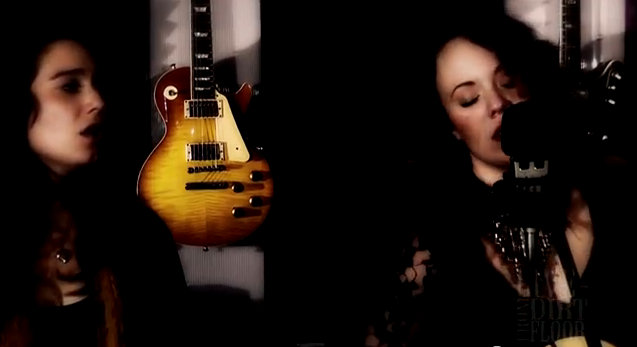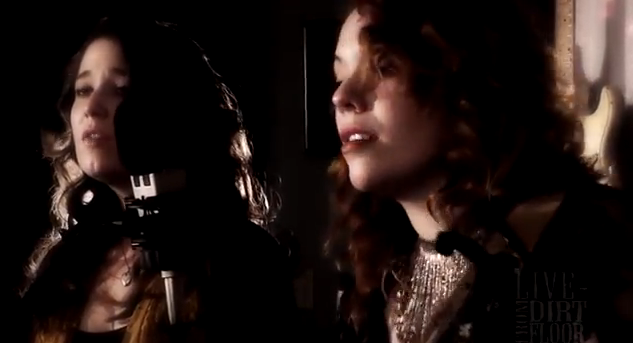
Elli Perry steps up to the microphone at Bluebrick Recordings in Avon, N.Y. She thanks the small, packed room for their time and attention, gestures to Samantha Harlow, her touring partner who will be singing in a few minutes, and launches into her next song.
Videos by American Songwriter
In the back corner of the room, a tall, willowy brunette blinks back tears. Two close friends sitting on the floor in front of her look at each other and clasp hands. By the end of the song about losing loved ones—about death, about cancer—the entire room seems to be shivering off goose bumps or wiping their eyes.
On stage, Elli knows that she has won over the room, but she just wants the day to end. It’s been a long one, crammed with a six-hour drive, a radio show, a PR mishap and a misplaced bag of merchandise.
Long days are a common occurrence when unsigned singers and songwriters tour. This isn’t a big-name run with a PR company and a great booking agent. These are two girls trying to break into your favorite radio station by loading a car full of gear and merch, and driving from city to city to play in bars, living rooms, recording studios and coffee shops. Basically, they will sing their hearts out at any place that offers a modest guarantee and a place to set up a table full of CDs, records, t-shirts and posters—all in the name of getting discovered.
According to research conducted by The Unsigned Guide in the UK, 71 percent of unsigned artists are hoping to land a recording contract. Unfortunately, only a handful of new acts get this privilege every year. But that doesn’t stop thousands of bands and solo artists from hitting the road to try to gain the attention of new fans, record labels, booking agents or pretty much anyone who can help them make a living off of their craft.
Elli has been touring for most of her life. She started out playing bars and other small rooms in Atlanta when she was 12, before leaving school and having a moderately successful foray in the city’s pop and hip-hop community in her late teens. But pop music just isn’t her genre—one glimpse at her bohemian style and unmatched vocals, and that much is clear. These days, Elli is booking her own shows, hoping to license her gothic folk music or appeal to a label in order to start making more money off of her art.
Samantha is in a similar position. A bar tender at the famed Nashville honky tonk Robert’s Western World, she learned through long nights slinging drinks how to win over an audience in the way that only a classic country singer can. She writes stories about the characters she meets in her job or the experience she had growing up in a broken Midwestern family, and then puts her stories to music.
This year, Elli and Samantha teamed up to tour together. They coined it the Road Maps and Bra Straps tour, and they are spending two months driving from Nashville through the Northeast before turning west and heading all the way to L.A. and back.
Some people call it DIY touring, and these two are among thousands of singers and songwriters who do it every year. There’s no tour bus, no sponsors—not even a booking agent helping these hopeful artists find gigs.
As Samantha puts it, “It’s honestly a lot like throwing mud at the wall and hoping that it starts to stick.”
Both Samantha and Elli are signed to Train Case Management, an outfit run by Alaina Thetford, who spent several years working for an independent record label before trying her hand at entrepreneurship.
“So often, touring on this level is just a crapshoot,” says Thetford, who also has experience as a publishing admin and studio engineer. “You never have any idea if you’re going to make money, reach new people, sell merch—if you’re going to be invited back. You’re planning a route on a computer from 1,000 miles away, and you never know how it’s going to be once you actually get to the venues.”
But the lack of certainty doesn’t keep Thetford’s clients from touring. She manages five artists, and every one of them devotes a few weeks a year to traveling on a small-scale budget and playing shows all over the country. Although artists return home in the red sometimes, it’s one of the ways Thetford believes they can get noticed by a label, publicist or booking agency.
“Even agents who charge you for each show they book have a screening process in place now. You have to still pay for their services, but you have to have a successful tour history to gain their interest in the first place,” she says. “That means an artist has to present documentation that proves they have toured successfully and consistently. It all starts with a successful tour.”














Leave a Reply
Only members can comment. Become a member. Already a member? Log in.